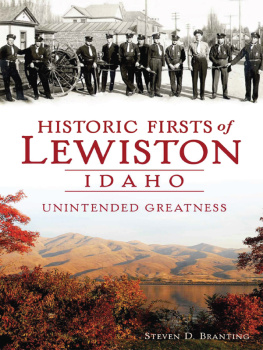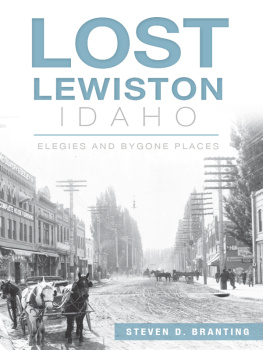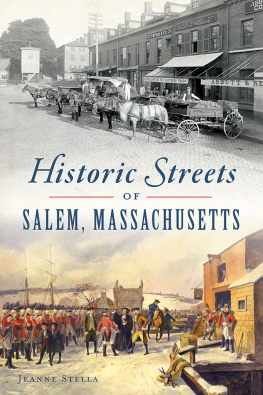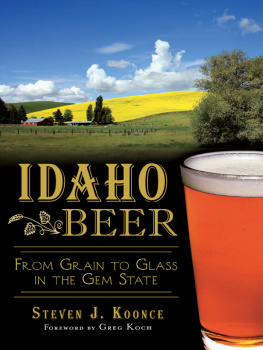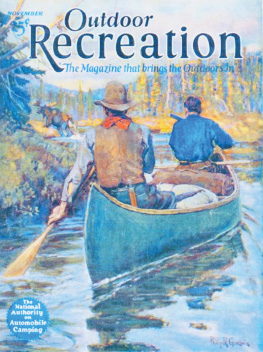

Published by The History Press
Charleston, SC 29403
www.historypress.net
Copyright 2013 by Steven D. Branting
All rights reserved
Cover image: Courtesy of Barry Kough, photo editor, Lewiston Tribune.
Unless otherwise indicated, all images in this book have been gleaned from the archives of the Nez Perce County Historical Society.
First published 2013
e-book edition 2013
Manufactured in the United States
ISBN 978.1.61423.851.5
Library of Congress CIP data applied for.
print edition ISBN 978.1.60949.912.9
Notice: The information in this book is true and complete to the best of our knowledge. It is offered without guarantee on the part of the authors or The History Press. The authors and The History Press disclaim all liability in connection with the use of this book.
All rights reserved. No part of this book may be reproduced or transmitted in any form whatsoever without prior written permission from the publisher except in the case of brief quotations embodied in critical articles and reviews.
For my wife, Shann, whose healthy skepticism effectively prodded me to prove to her that I knew what I was talking about.
Acknowledgements
The assistance of Mary E. White-Romero, museum assistant at the Nez Perce County Historical Society, was invaluable in the preparation of this volume.
American humorist Will Rogers once quipped, Its not what you dont know that hurts you; its what you do know that aint so. A failure to clearly annotate historical research with primary sources perpetuates speculation, misinterpretations and poor scholarship. The reader will find citations provided for most of the entries. Future historians deserve to know my sources, especially when that information relates to junctures of circumstances in the record of events.
And lastly, a few comments about evidence: Absence of evidence is not evidence of absence. No one on the frontier anticipated being the first to do anything. William Shakespeare did not know he would become the William Shakespeare. In several instances in this story, the clues converge, not to an absolute, definitive point, but to a degree of high probability, conclusions based on the best evidence. That probability is so noted in several entries. If history were so clear, certain and concise, we wouldnt have such a need for historians to reconstruct events no one took seriously at the time.
Introduction
A people which takes no pride in the noble achievements of remote ancestors will never achieve anything worthy to be remembered with pride by remote descendants.
Thomas Macaulay
Each village, hamlet, town and city has a multitude of stories to tell, varied as communities are by the personalities that came together to create their culture. Lewiston, Idaho, is certainly no different. It, too, has crowed with the joy of pride when someone in its ranks achieved notoriety. It, too, has suffered the anxious moments of pestilence that walks in the gloom, only to step back, reassess and move forward. Growing pains require people who are not afraid to change from necessity and opportunity to be ready for the unexpected and to come up with other solutions. As mile Chartier wrote in Propos Sur la Religion, no. 74, Nothing is more dangerous than an idea when it is the only one you have.
On October 10, 1805, the Lewis and Clark Corps of Discovery first visited the site where Lewiston would appear more than fifty years later. Lewis wrote in his famed Journal:
The Countrey about the forks is an open Plain on either Side I can observe at a distance on the lower Stard. Side a high ridge of Thinly timbered Countrey the water of the South fork is a greenish blue, the north as clear as cristialPhotographers of the Far West: A Biographical Dictionary,; worthey of remark that not one Stick of timber on the river near the forks and but a fiew trees for a great distance up the River.
The corps camped nearby for one night and continued on its journey to the Pacific.
Decades of quiet activity by fur traders would pass. Deeming the region of seemingly little economic importance, the federal government allocated the area to the Nez Perce tribe as a reservation in 1855. The discovery of gold in the Clearwater basin in 1860 and the outbreak of the Civil War ensured the creation of a new territory that would strengthen the Union cause.
Lewiston began as a motley collection of treasure seekers, opportunists, dance hall girls, Chinese laborers and scoundrels, with, of course, those searching for better lives thrown in. To say that Lewistons genesis was some frontier birth of Venus would ignore the evidence. Quite frankly, it was a town never intended to last beyond the short-lived rapture of the central Idaho gold rush in the early 1860s. And yet, Lewiston bore the trademark of the great cities of the world: It put down its roots on the banks of a major river (in its case, twothe confluence of the Snake and Clearwater). The native Ni-Mii-Puu (Nez Perce) called it tsceminicum, meeting of the waters.
Lewiston started simply enough. On May 13, 1861, the Colonel Wright, the first stern-wheeler to run the Snake River, tied up at the confluence. Launched on October 24, 1858, the 110-foot-long boat was making the run between Walla Walla to Portland when called into service to go up the Snake River toward the new gold fields. Captain Leonard White commanded the Colonel Wright for several years, having mastered his skills on the Willamette River in Oregon. White unloaded his cargo of stores and prospectors and returned downstream. By October 1861, reports were circulating in Walla Walla that a town site had been established, much to the chagrin of the agent at the Nez Perce reservation, which at that time stretched from La Grande, Oregon, to the Lolo Pass on the border of present-day Montana. The richness of the river basins and their bounty heightened the sense of opportunity for those who had faith in the fledgling collection of tents and rough-hewn lumber. Lewistons population would, for a time, surpass that of Seattle and Portland combined. And that is where our story begins.
Historic Firsts of Lewiston, Idaho
1861: IDAHOS FIRST POLICE DEPARTMENT
The facts are always less than what really happened.
Nadine Gordimer
The January 25, 1862 issue of the Washington Statesman (Walla Walla) carried the article Police Organization at Lewiston, relating recent events in the young community during the last few months of 1861. People were buying and selling lots, forming businesses and instituting a city governmentall in violation of the Treaty of 1855 with the Nez Perce. In July 1861, A.J. Cain, the agent for the Nez Perce, had protested that locals were developing a community that cannot be permitted under any circumstances. Cain threatened to tear down any permanent buildings placed on the land. Residents reacted by erecting framed canvas tents. At night, the temporary homes glowed with fireplaces. The flimsy canvas dwellings nearly caused the towns demise in the winter of 186162, one of the regions most severe on record.
Among the events reported on by the Statesman was the fact that Lewistons squatters, who were described as men of towering ambition, had appointed a town constable, Idaho and Lewistons first policeman: Edward Everett, who then disappeared from the historical record. Being a lawman during Lewistons infancy could be very dangerous. At 10:00 a.m. on March 30, 1865, word reached Lewiston that territorial secretary Clinton DeWitt Smith and a detachment of troops from Fort Lapwai were headed for the town to take custody of the territorial seal and important documents. Rumors spread that the detachment would burn the community. Town leaders calmed the crowds that gathered to defend the town. Some of the soldiers took control of the Clearwater River ferry, while others, ignoring the presence of the deputy marshal, J.K. Vincent, broke the lock on the executive office building on Third Street. With the seal and official materials in hand, Smith and his escort crossed the Snake River by ferry into the Washington Territory and out of the jurisdiction of Lewistons law enforcement officials.
Next page
